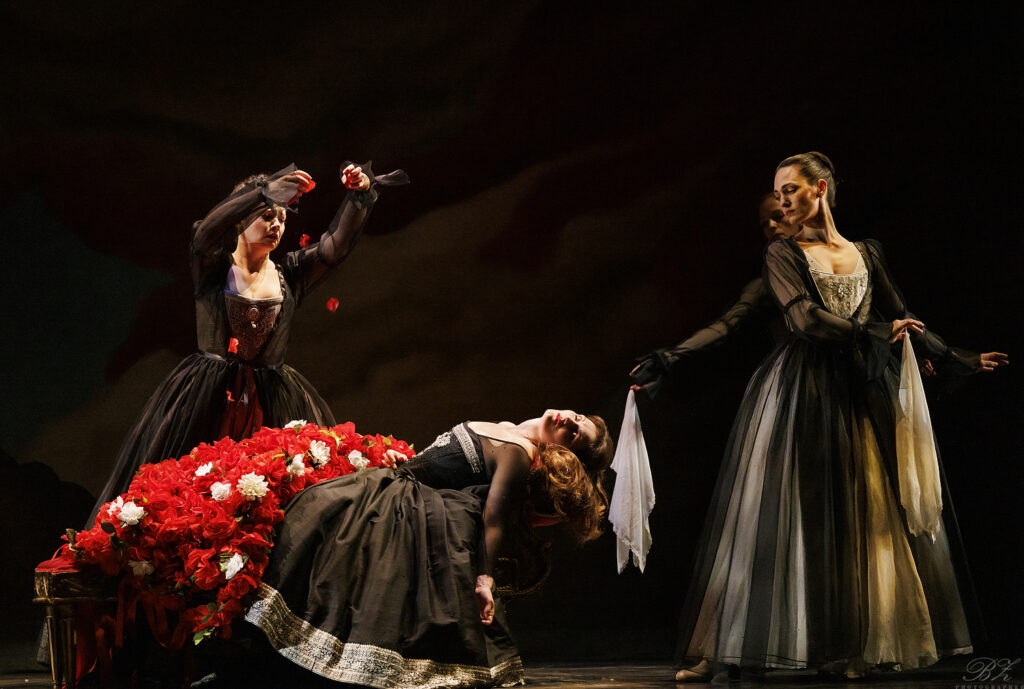Dido and Aeneas occupies a place of particular favour in the annals of Opera Atelier. An inaugural offering by the then newly emergent early opera specialist in 1985 at the Royal Ontario Museum, Henry Purcell’s gloriously stormy, mythical romance has since witnessed no less than a dozen distinct revivals during the course of the company’s 37-year history. Extensively toured to Europe, Korea and Singapore, the work has become something of an OA signature piece.
After two long years of agonizing absence from the live in-person performing arts scene, Opera Atelier returns to the gilded grandeur of the Elgin Theatre with a taut, crisply mounted rendering of Purcell’s timeless Restoration masterpiece. No work could be more fitting by way of a transitional offering bridging the pandemic-mandated small screen and the infinitely more sweeping dimensions of the classic proscenium.
Seen in purely historical terms, Purcell’s exquisitely poignant retelling of Virgil’s tale of the doomed Queen of Carthage and her helpless love for the wandering Trojan prince, ultimately destined to found Rome, is heavily clouded by a profound lack of authentic musicological fact. Reputedly premiered in 1689 at a prestigious girls’ school in Chelsea, Dido and Aeneas has come to assume overtly legendary status as the first opera written in English. The appearance of fellow countryman John Blow’s no less groundbreaking Venus and Adonis, presented at precisely the same venue some five years earlier, seems not to concern icon-makers. That both pieces were reasonably well-seasoned when they first appeared at Josiah Priest’s Chelsea academy now seems distinctly probable. Like Venus, Dido was, in all likelihood, first presented as a Masque at the court of Charles II, explaining at least one of the most striking aspects of Purcell’s composition — the prevalence of dance. Priest, academic entrepreneur, was himself a dancing-master of no small renown.
Treating history more as broad canvas than rigid, unyielding frame, director Marshall Pynkoski and choreographer Jeannette Lajeunesse Zingg splash action and art across the stage with characteristic abandon.
Purcell’s music — vivid and unfailingly varied — presents a second set of abiding artistic issues. For all its immediacy and colour, the question of authorship still clings to Dido and Aeneas. No manuscript score written in the composer’s hand survives. In fact, the first evidence of any sort of formal recorded notation — authentic, re-invented or both — did not appear until 1775, almost a century after the work premiered. The practice of recreating missing or fragmentary orchestral themes and movements in Dido and Aeneas is longstanding and continues to some extent today.
Constructed from smooth, translucent layers of extant melody neatly excised from Theatre Ayres penned by Purcell and Continental contemporary Marin Marais, music director David Fallis constructed something of an unapologetic expanded pastiche in the case of the long-absent Prologue when the opera was last presented in 2016. It was a bold gesture but one destined not to make its way into Opera Atelier’s current, breathlessly compact 60-minute treatment of Purcell’s crackling 3-act tragedy, relying instead on a rather more generally accepted mainstream approach to reconstruction, though certainly not without a pronounced degree of vitality.
Leading a tirelessly energetic period chamber orchestra drawn from Tafelmusik — 1st and 2nd violins, viola, violoncello, lute/guitar, harpsichord and percussion — Fallis and consort musicians shine, delivering a sparkling performance marked by a fine sense of dramatic proportion. Dances are particularly well-gauged, Lajeunesse Zingg floating her superb company of artists on a tide of fluid harmony and surging tempi. The swirling Groves Dance, an intricate mini-Baroque ballet, is given a breezy airing. Frolicking with castanets and finger cymbals, Lajeunesse Zingg and partner captivate, dancing to a delightful 17th century Spanish folly charmingly set by Fallis for violin and period guitar.
Appearing as Dido, soprano Meghan Lindsay is as radiant as she is disconsolate, her silvery moonlit tone shining with apprehension, frightened as much by the intensity of her love for Aeneas as the machinations of the gods. The namesake roles of Dido and Aeneas, invoked as a matched pair in the title, are far from equal in terms of operatic demands. Purcell’s taut, compressed tragedy places Dido squarely in the eye of a raging emotional tempest. Lindsay infuses the character with enormous humanity, singing Purcell’s immortal lament, When I am laid in earth, with heartbreaking resonance.
Tenor Colin Ainsworth sings Aeneas with great style and control, generous and respectful, dialing back his potentially hyper-dynamic instrument — unleashed in countless towering appearances with the company over the years — in favour of a mellower, more circumspect ensemble-centric sound.
Soprano Mireille Asselin appears as Belinda, sister to Dido, loyal confidant and supporter, launching the proceedings with a particularly nuanced rendering of Purcell’s attention-commanding air, Shake the cloud from off your brow, less stern admonishment than expression of concern.
As Bedlam, resident evil sorceress and joy-devouring villain, soprano Measha Brueggergosman-Lee delivers an uproarious performance positively engulfed by melodrama, posing and posturing with outrageously flamboyant malice, her deliciously wicked cackle worth the price of admission alone.
Mezzo-soprano Danielle MacMillan and soprano Cynthia Akemi Smithers are a pair of zestful witches, MacMillan doubling as Bedlam’s sinister elf, shining-faced sower of chaos, ungodly impostor of Mercury. Tenor Spencer Britten is a bubbly, hornpipe-jigging mariner.
A soaring troupe of exceptionally fine young voices courtesy the Bach Children’s Chorus partnered by a robust contingent of more mature choristers drawn from the Nathaniel Dett Chorale greatly expand the breadth and depth of this shining jewel box of a production.
“This night feels like a dream,” Pynkoski observed in his opening address to the audience, a palpable current of excitement animating his voice. Judging from the size of the near-capacity crowd and the magnitude of the standing ovation at the close of the evening, the overarching sense of enchantment was resoundingly shared by all.


